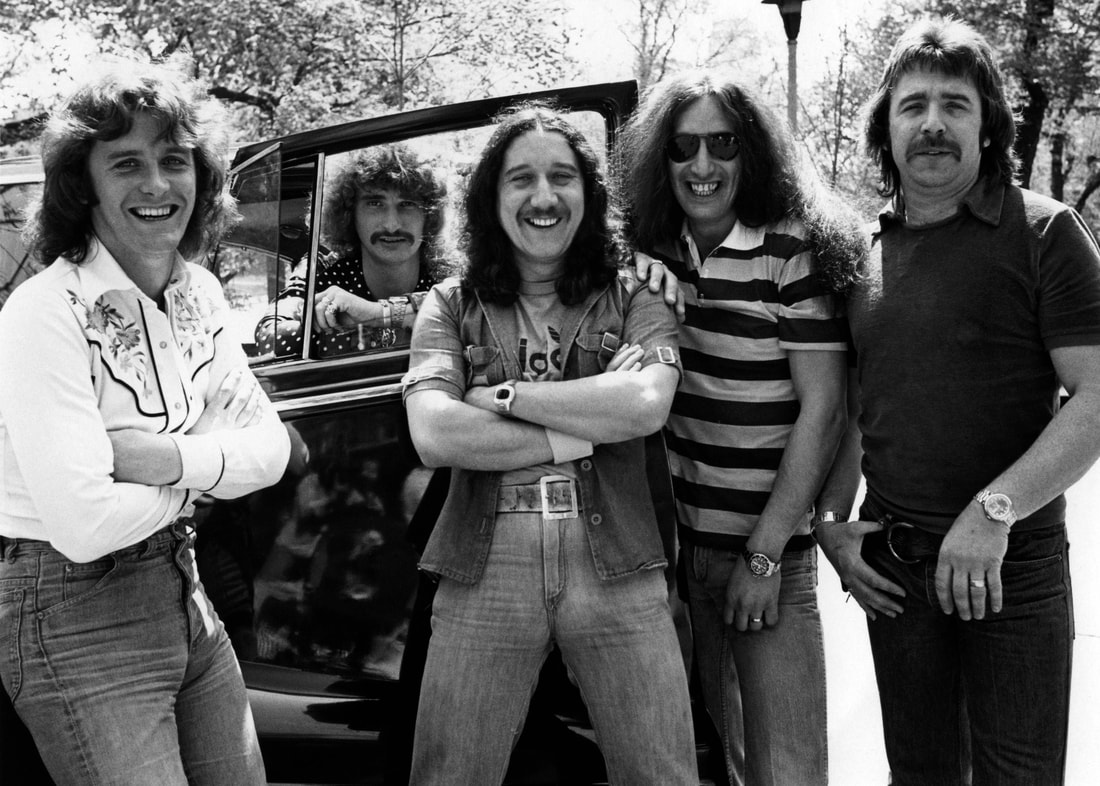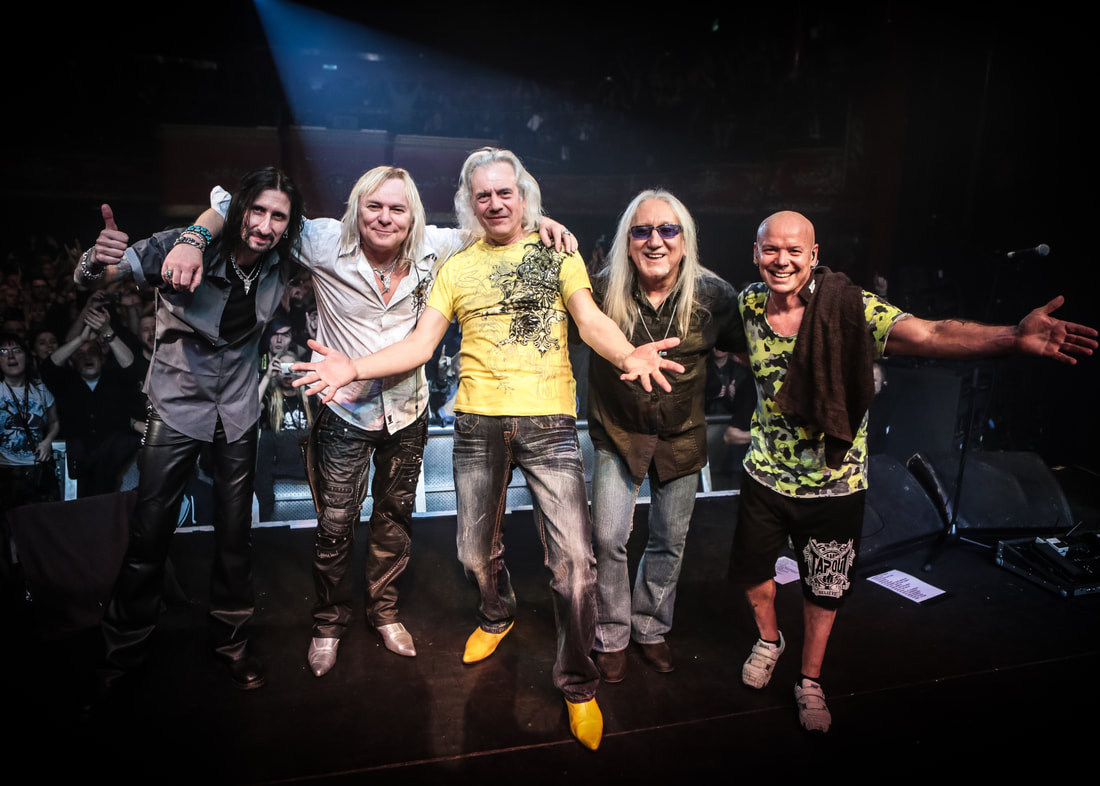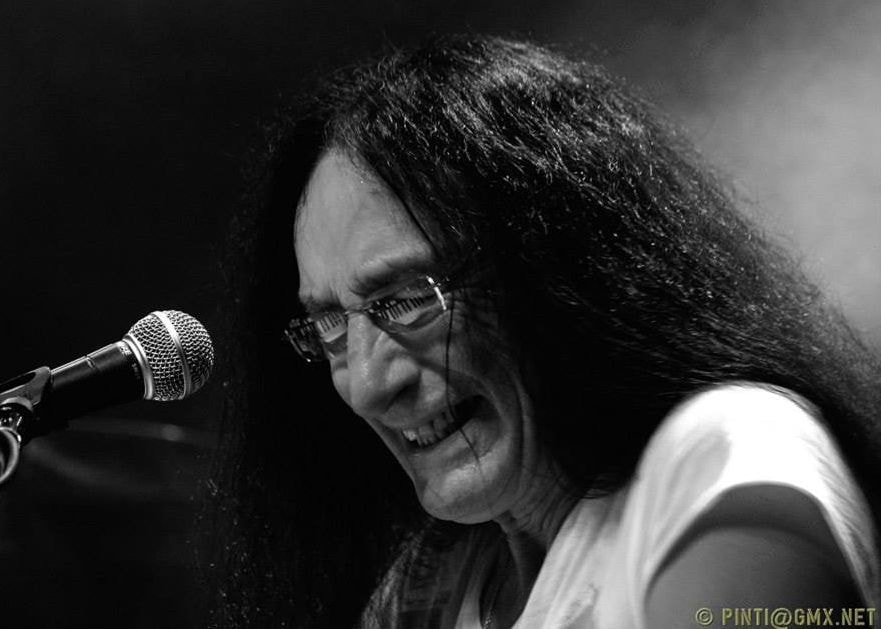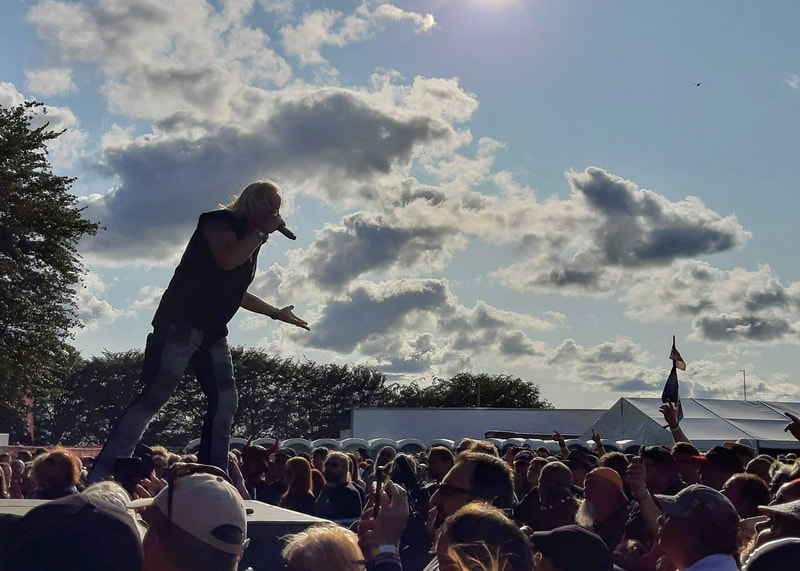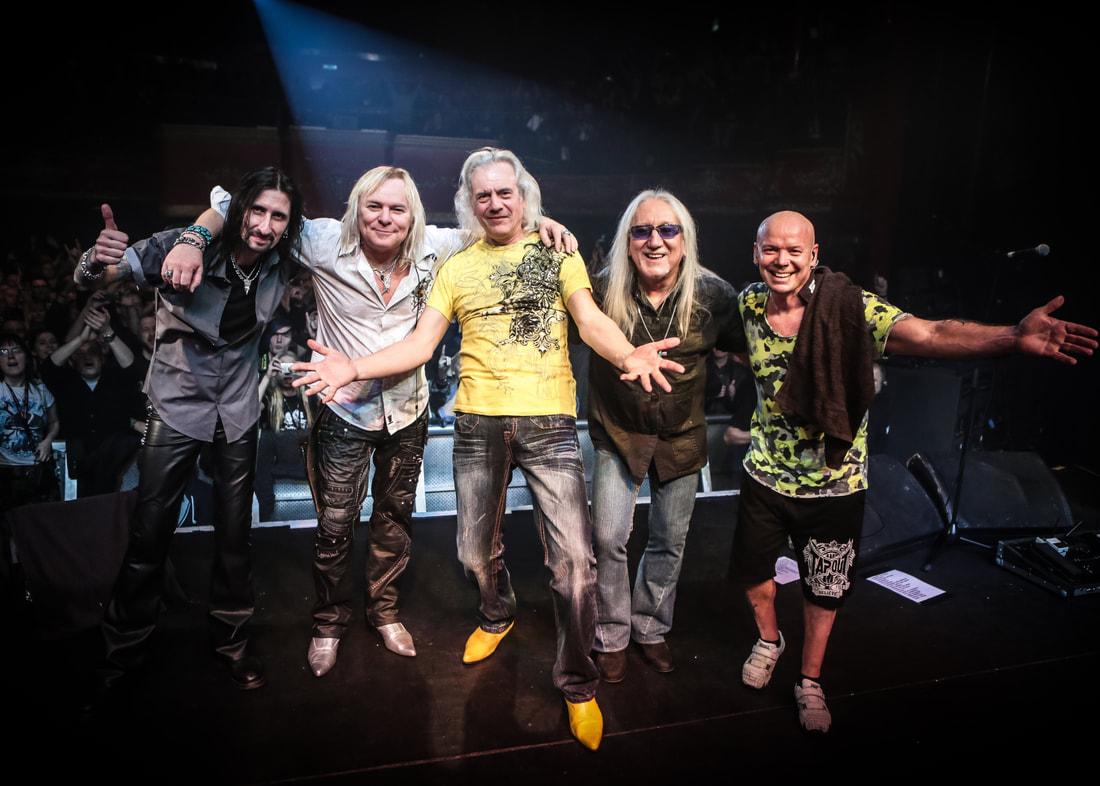|
Celebrating an almost unparalleled fifty year career, Uriah Heep are classic rock elder statesmen. As demonstrated by their recent round of summer shows however, they’re still a vital force. The passing of a number of key former band members in the past twelve months however, have left last man standing Mick Box in reflective form. “I can’t say it’s comfortable, but I’m carrying the flag, and so be it”, he admits as we sit down to chat. Talking curating the band’s legacy, his feelings on his fallen friends, and the new album, we get in-depth with the founding guitarist. Living the dream; Eamon O’Neill.
Hi Mick, how are you today?
I’m good, mate, yeah, really good. I’ve just come back from finishing the new album, which is now being mixed, so we’re up and vibed and positive, yeah. It’s been a few years since ‘Living the Dream’, so you must be excited to get it out. Yeah, but two of those have been covid-related. We would have done it two years earlier, but we weren’t allowed to be in the same room! Uriah Heep are a band with a career of fifty years; is that the longest break you’ve ever had? Ever! I mean, we’ve played sixty-two countries so, even if you don’t hear about us we’re out somewhere playing concerts. So yeah, it’s been a really trying time I have to say, because you miss not only the shows, meeting people, communicating with people, but of course the band and crew banter, which is a great source of humour. I don’t miss the travelling though! I have to say, I’m the sort of person that when a hole appears, I fill it up with something else, so I’ve kept busy doing lockdown diaries and various videos, and ‘Ask Mick’, where the fans can ask me stuff. I’ve got my cancer charity, and I do the Cameo thing where you’re wishing people happy birthday or whatever it is, so I’ve kept busy. Yeah, writing songs for the new album, and I just filled all the spaces up as best I could. Rewinding to Summer 2021, and Uriah Heep played some superb shows at Steelhouse in Wales, and Stonedead Festival in Newark. Well the first one was Steelhouse in Wales up on the top of the mountain, and I think I underplay it by just saying it was very emotional; it was amazing. I mean, all the songs to me took on a different light, and I had a little tear in my eye because of the passing of all the members of late and of old, which is why we stopped the show at one point and went out to the ego ramp and had a Jack Daniels and a cheers to everybody to say; "we’re thinking of you". It was very important to do that, but it was emotional on the audience’s level too. They were… unleashed from their homes, coming out and doing what they love, listening to rock music. So, it was a wonderful time, and one I won’t forget in a hurry. I’m glad you touched on the toast you made, how did you feel playing a song like ‘July Morning’, which has a really heavy emotion to it even ordinarily? That’s the time when the tear happened. I was quite emotional, purely because I was thinking of all the band members that are not here that I’ve played that song with, as much as the ones I was playing with that night. So, it was a really emotional time. I saw a post online that showed the cover of the ‘Wonderworld’ album, with only you remaining on your plinth; that was quite sad to see. Yeah, I mean, to take it a step further, if you look at the ‘Sweet Freedom’ cover, everyone passed away in order, with me at the end. I can’t say it’s comfortable, because you think; “oh my word”. The last man standing is not a thing that I thought would ever happen. I’m not happy that it has happened, really, but I’m carrying the flag and so be it. As long as I’ve got my health I’ll be up there doing it to give everyone access to the music that all those great musicians, together and individually brought to the band, that then went out to the world. Lee Kerslake’s passing must have hit you hard. It was dreadful. First off, I saw him the week before he passed away, and I knew that when I left there that there wasn’t long left because although his mind was sharp – I have to say – and we talked a lot of music and he came to life, he had the twinkle in the eye! I was playing the songs I’d just written, and he was going; “oh, that’s great! Do this, do that!”; it was marvellous, and he just came to life, but his body was just falling apart, to be honest, and you could see that, and it was awful to see; a mate that I’ve travelled around the world with. I mean, we’re actually brothers from different mothers, if you know what I mean; we were that close. So it’s terrible. It was you who asked him to step away from the band back in 2007, for the sake of his health, wasn’t it? You’re absolutely right. I did phone him up and go; “look Lee, you’ve got to look at your health before anything. If you’ve not got your health, you’ve got nothing, so let’s get you off the roundabout and go to a few doctors and get things that are wrong with you corrected”. He did that, of course, and there was never a question of coming back because it just deteriorated very quickly. I was always fearful of us being on the road and having to go in the room and something happening; that’s how far down the line it went. I’m getting a bit choked up at that. With his passing, it was almost a five-year thing; I mean, I was at every part of the journey with him. Even when he was having chemo and was in a room with a lot of people having chemo, he’d say; “I’m the only one laughing, Mick because you keep sending me jokes!”. I knew the hours he was going in so I’d send him loads of jokes that would tickle him. That’s an amazing relationship you had! He’d say; “I’m sitting here giggling, and everyone’s sitting here depressed!” And I’d say; “well that’s good!” It’s a good way to be! So, I was with him every step of the way, and in the end, it wasn’t a surprise, I did see him the week before, and he eventually passed away. His wife Sue said; “there’s a good chance you won’t see him again”, and I said; “I can see that”. So, it was a horrible, horrible feeling, but then I looked at all the positivity of everything. When I was with him on the last visit, we did go through all the funny things that happened on the road, and we both remembered things differently, which made us laugh. It was a good time to spend with him. When you look back over those 50 years, does it seem like the blink of an eye? Oh, absolutely. As we all do, well, I do anyway, you only look back on the positive, fun things, and the other stuff gets buried, otherwise you’d just waste negative energy thinking about it. So yeah, we looked at all the fun stories. We’ve been all over the world together many times, and you can imagine the sort of mischief we got into! Speaking to Ken Hensley last year, he spoke of the huge contribution that the band made, turning his songs – specifically ‘July Morning’ - into what they became.
It’s chemistry, 100%. He did bring in the bare bones of things, it might even have been three chords and the hind of a melody and a couple of words, and we just developed everything. It was just the chemistry; we were in tune with each other, and we could make anything sound great, and we did; we proved that. For instance, a song like ‘July Morning’, he had that in three different parts. If you listen to the song, you can see the three different parts; the riff, the verse, and the bridge. They were all different parts but they were all in the same key, and I came in and I heard all the different parts being worked at as individual songs, and I said; “we should just glue this together and it’ll sound fantastic”. Then we put the intro on, of course, and the outro, and it all took place very quickly. A lot of things happened in the moment. Ken’s contribution to the band was colossal. Ken wrote some amazing songs, undeniably, but he always sat outside the band. He always saw everything, not as a friendship, but; “everything is a business”, and that kind of puts a tinge on those great songs, if you like, from my standpoint. Never the less, that’s the way he saw it, and the songs were all brilliant, so you just have to get through the murky water and come out smiling. Even to the end, we only ever talked about business that happened while he was in the band; there was never any other context at all, really. With everyone else, there has been. Going back to the bands heyday in the mid ‘70s, what was it like to be in the middle of that success? We were living the dream mate, as our last album said. We had Lear jets, we had bodyguards, we had whole hotel floors with bodyguards outside each room, we were mobbed everywhere; it was just dreamland. It was a hell of a ride, I have to say. I was hanging on for my life, at times! Did you enjoy that level of success? Yeah, I enjoyed it – of course I enjoyed it. I was a young guy, running around the world with a guitar, playing in a great band having the best time of my life. But, you know, eventually, excess came into play, and I think our management drove us too hard. We were doing two albums a year, and touring endlessly. We were coming back from a U.K. tour, going in the studio, working overnight, then flying to America to start a three month tour. It was that sort of pressure. But I look on it fondly, because I think apart from all that, we did come through with some good music, which is what it’s all about in the end. I’ve got a real soft spot for what I call the ‘Bon Jovi years’, and the ‘Raging Silence’ [1989] album. We didn’t have the hair! We had the long hair, but we didn’t have the Bon Jovi hair, backcombed and what have you! *laughing* It was certainly not in the image; hairspray was not allowed in our dressing room! I think we sort of got hooked into that whole ‘80s musical production thing that was happening at the time. You had to have a certain sound to even get radio play, and people were going in and spending a year and a half to make an album. We’d never spent more than three months ever, in fact, we done the last one in eighteen days. When you’ve got it down, you get in the room, you play. You don’t share files, you just get in there and do it, and you do it well. You do it quickly, and you get the impetus of that, and the live feeling and the good stuff that makes your hair stand up. So, back in the ‘80s there was an element of that production that came in, and we kind of followed that. Even when we went into the years with ‘Abominog’ [1982], when we had great success, and then we really hit that production thing. And Peter Goalby of course, had a really great ‘80s voice for that era, and he fitted in well, so it kind of gradually evolved into that. And then we went backwards to how we used to do it, which is how we do it now. Does a version of ‘Blood Red Roses’ with Pete Goalby singing exist, or did you even demo it with him? No, I don’t think we did. I know he’s got a version of it with him singing it, but I’m not sure we did. I can’t remember, to be honest. The song was written by Pete, but recorded by the band after he left; how did that come to be? I always look at songs to be the most important thing regardless of what’s going on around it, and Pete had this song and it was a great song, and I said to him; “how about it, mate?”, and he went; “go ahead! Please do! I’d love you to”, because I never fell out with Pete – I never fell out with anyone, really – and we’re still good mates. We’re still emailing and all that stuff, along with John Sinclair [keyboards, 1981 – 1986] and everyone else. Yeah, it was a good song, so I said; “well let’s do it!” Clearly the most important aspect of ‘Raging Silence’ was the introduction of Bernie Shaw, who remains the band’s lead singer to this day; did you think it would endure that long?
No, no. Of course you can never predict those things, but I have to say, I had a six-week tour of Germany, and it was six nights a week, and most singers get a little rough after three nights – they get a bit precious – but Bernie motored through it. And the other important thing that came to me was that fans were coming up to me saying; “Mick, now we’ve got a Heep singer”, which really resonated with me. Not only is he durable, and he can really pound it out and he’s not precious, but the fans are loving it too, so it was a win / win. That German tour really cemented the fact. And then, I’m good friends with Bernie, in fact, we’re very good friends, away from the band, and in the band. I was the best man at his wedding and all that sort of stuff, so we have a great friendship apart from with Heep. I wanted to talk about the amazing ‘Every Day Rocks’ picture disc LP and t-shirt box set; how was it working on that? BMG suggested it to me, and I went; “what a great idea”. The vinyl is fantastic, and then the shirt to go with it, and the day of the week – Monday to Sunday – what a great, week in the life of Heep; fantastic! I had to okay the pressings and everything else, and so I put them on my record player and relived the first seven albums. It was just absolutely amazing, because I never listen to our music at all; I just write new stuff and just go that way. So I listened to it and went; “wow, no wonder we were successful; this is GOOD; that’s a great solo, look how high David’s voice is; what great harmonies we had!” It was one of those; there was a big smile on my face all the way through! So it was really heart-warming to be honest, but at the end of it, that thought came about the last man standing. At the end of it all, we did achieve a lot, and it drives me forward to make sure that we continue to play a lot of those great songs on the road so people can hear what great musicians and song writers they were. Will there be a follow-up box to that, with the next set of picture disc albums? Well, our original box set [’Fifty Years in Rock’, 2020] incorporates all 25 albums. That has been done, and BMG had to licence it from all the other record companies that we’d been working with, but they did it well, and it was great. In fact, the last thing I saw of Ken was when he did a video of the unboxing of the box set. He was very proud about it and spoke very favourably about it, and he was very happy about it, and there was a bit of a buzz going down memory lane. And then, the next call, I think it was about two days later I found out he’d passed away, and it was just a shock. In these instances you just go numb, and people say; “how are you feeling; are you alright?”, and you don’t know because that’s part of your life that’s disappeared. When it’s right there on your doorstep, it just leaves you numb. To a degree, it still does. Also recently released was the ‘Choices’ box set, which has tracks hand-picked by a number of key band members; how did you make your choices? Well it was a strange one because BMG asked me about it, but didn’t tell me anybody else was doing it, so I said to them; “am I the only one?”, and they said they were going to ask Ken, and Paul [Newton, original bassist] and Lee, and I thought, first off, I’m not going to choose the ‘Easy Living’s and the ‘July Morning’s; all the ones that you’d think, so I went for the deeper tracks. So, I’ve got everything in order in my vinyl, and I just went through them; put one on, put one on, put one on. I’d put the needle on an go; “that’s great; we’ll have that!”, because I couldn’t get too deep, otherwise I’d still be there. I’m a Gemini, so whatever I tell you the list of songs is today, tomorrow I’ll be thinking another. That’s why I’ve never had a tattoo; I could put my kids’ names on, my wife’s name on, my dog’s name, but tomorrow, I’d want a different script! That’s the sort of person I am; ideas and things float constantly, and I like to keep it like that. So, what would you say, today, are your three favourite Uriah Heep albums? Oh my word, three out of twenty-five? Twenty-six now! It’s very difficult. Obviously, the first one [Very ‘Eavy… Very ‘Umble, 1970] introduced the band, and there was a bleed-over from Spice, which is why it’s so varied; you’ve got a bit of folk, jazz, rock, blues, everything on it – which is why we were called Spice. In the culinary world there are many, many spices, and we didn’t want our music to be any one genre; we wanted to be able to do everything, so that’s why that bleed-over to the first album happened. So I’ll have to say the first one, even though I’d probably go for ‘Look at Yourself’ [1971] as a replacement, if you like, because ‘Look at Yourself’ is where we actually found out that we wanted to be a rock band and I think that shows, loud and clear on that album. But I’d still go with the first. And then? You’ve got to go ‘Demons and Wizards’ [1972] because that took us on the world's stage, and I’d have to go ‘Living the Dream’ [2018], all the way up to today. I could go ‘Abominog’ [1982] because it was a resurgence for the band; I could go ‘Sea of Light’ [1995], another resurgence for the band, but I think ‘Living the Dream’ is a statement of where the band is now, and that it’s done justice to the name Uriah Heep. A lot of people would make a case for ‘Wake the Sleeper’ [2008] being in there. Again, that was a statement because we hadn’t recorded an album for a while, simply because the industry had dissolved with the explosion of the internet. The record companies were amalgamating, disappearing, and it was just a very difficult time, so we did what we do best, go out on tour, and release live DVDs until it all settled down. Then Universal picked us up, and we went; “right; ‘Wake the Sleeper’; that’s good. You’ve woken the sleeping giant now”, and that’s the mindset we went into making that album. I think it’s got some great songs on there too; ‘What Kind of God’ is a lovely song, and just the opening track [‘Wake the Sleeper’] was the statement we needed to make. What would your least favourites be? You’ve got me there. I think in the ‘Firefly’ [1977] and ‘Fallen Angel’ [1979] era we were going a bit poppy. Even on ‘Innocent Victim’ [1978], I was going; “come on John, let’s write something [heavier]”, so we wrote ‘Free ‘n’ Easy’ to get a bit of rock in there. Even on ‘Fallen Angel’, on ‘Woman of the Night’ we tried to get a bit more edge to it; all the songs were coming in very, very poppy-ish; rock / pop, if you like. And maybe ‘Conquest’ [1980]. Looking to the future, and what can you tell us about the forthcoming Uriah Heep album?
Jay Ruston [producer] has done a great job on the guitar sound. They sound fantastic. He did the last one, so we thought we’d go with that as a winning combination. We’ve got all the songs but we don’t know what’s going to go in as they always ask for a couple of bonus tracks, so it’s in the hands of the record company. We’re nowhere near a title yet, although I’ve got a list of titles that I’ll present to the band and see which one we all go for. But, as far as release is concerned, the unfortunate thing is next year when we start touring, we’ve still got to celebrate our 50th anniversary, so it would be a conflict of interests with that and the new album. So we’re not quite sure how the record company’s seeing that at the moment. So you may keep the album back until after that tour? It will be released, but not necessarily in the normal run of events. In the normal run of events we’d finish the album and it would be out, but you know, they don’t like the summer, they don’t like this, they don’t like that, the record companies, and they have their own agenda as to where they’re going to put the money into releasing it and advertising it. So, we’ve got to swing with them, although we’re saying; “don’t make it too late, because we’ll go stale on it!” We’ll have another one by then! Finally, what’s next for Uriah Heep? Well, obviously we’ve got the album to finish. We’ve got to find the cover, we’ve got titles to deal with, put it on order and stuff like that. And touring plans? In April we’re meant to go to Russia, but that’s not looking good now because they haven’t really got a handle on covid anywhere, and we don’t just go to Moscow and Saint Petersburg; we go right out to Vladivostok and Yekaterinburg, and we really travel it. We’re lucky we can do that, but by being the first rock band to play there, in 1987, it really had an impact and resonated throughout the rest of the country, which is great. So, with that looking unlikely, our agent and managers are now looking at an American tour, and we hope that comes to fruition because we just want to get out and play. We’ll see what happens. It’s really up in the air, but we’ll do what we do best; I’ll carry on doing Cameos for my charities, writing lots of songs, and there’s lots of areas in the recording side of things I want to get involved in, so I’ll just immerse myself in that until we come out the end of the tunnel smiling! Like this interview? Like us on Facebook and follow us on Twitter for regular updates & more of the same. Uriah Heep's 'Every Day Rocks' is available now, via the band's webstore. 'Choices' is available now. Click here to order. |
|
Uriah Heep
"As long as I’ve got my health I’ll be up there doing it to give everyone access to the music that all those great musicians brought to the world." - Mick Box.
© 2016 - 2024 eonmusic.co.ukContact: [email protected]
|

